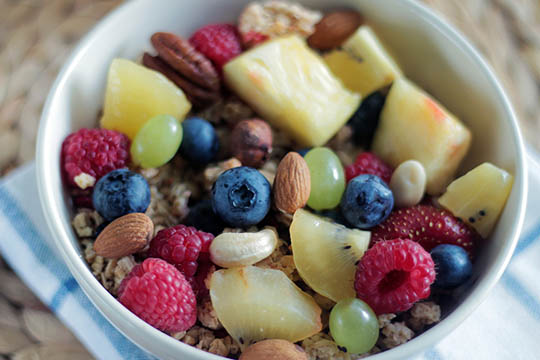What’s actually in your cereal?
By Noor H. Salem, Certified Integrative Nutrition Health Coach
They say breakfast is the most important meal of the day. There’s no doubt it’s important to provide your body with energy, but the type of food you eat can very much impact your day-long energy and mood. Today, the majority of people consume breakfast cereals, sugary frozen waffles, and instant oats for breakfast. It may be much easier and convenient to dump cereal and milk in a bowl, but you must be aware of what you’re feeding your family.
 That box of colorful cereal swimming in sugar, chemicals, and preservatives is not the best thing to eat early morning, let alone feed a child. It especially concerns me when parents feed their children colorful breakfast cereal, and then question why the child cannot concentrate in school. Food dyes such as yellow 6, red 40, blue 2 and green 3 are in no way, shape, or form, natural. They are literally food dyes; think paint in the art classroom! They have been linked to hyperactivity in children- this answers why many children are unable to focus in school. The majority of kids’ cereals are advertised as being good sources of fiber, vitamins, or minerals. The problem is the majority of these nutrients are synthetic and fortified. Atop that, these cereals are extremely high in sugar or even worse, high fructose corn syrup. That’s aside the concern of the genetically modified ingredients and the harmful additives found in many popular breakfast items.
That box of colorful cereal swimming in sugar, chemicals, and preservatives is not the best thing to eat early morning, let alone feed a child. It especially concerns me when parents feed their children colorful breakfast cereal, and then question why the child cannot concentrate in school. Food dyes such as yellow 6, red 40, blue 2 and green 3 are in no way, shape, or form, natural. They are literally food dyes; think paint in the art classroom! They have been linked to hyperactivity in children- this answers why many children are unable to focus in school. The majority of kids’ cereals are advertised as being good sources of fiber, vitamins, or minerals. The problem is the majority of these nutrients are synthetic and fortified. Atop that, these cereals are extremely high in sugar or even worse, high fructose corn syrup. That’s aside the concern of the genetically modified ingredients and the harmful additives found in many popular breakfast items.
Unless you are purchasing cereal that is certified organic and with the non-GMO verified label, you are most likely consuming some genetically engineered ingredients. The majority of cereals contain corn or corn meal as one of the first few ingredients. Many others contain soy, another crop that is most likely genetically modified. Genetically modified food has been linked to cancer, autoimmune disease, infertility, allergies, reproductive disorders, and autism. If you really love cereal, and can’t imagine going by your day without it, don’t despair. Simply look for the USDA Organic label, or the non-GMO Verified label on the box.
TBHQ is a chemical with the name that sounds like a science experiment: Tertiary butyl hydroquinone. Unfortunately, TBHQ is found in food items you may have sitting in your kitchen pantry at the moment. TBHQ may be found in fast food, cereals, frozen meals, or snacks, such as crackers. It’s usually added to foods with iron to avoid discoloration, change in taste, and to prevent rancidity. Some studies found that this additive has increased the risk of tumors, kidney enlargements, and hyperactivity. The National Library of Medicine claims that TBHQ has been reported to cause some instances of vision disturbance. By all means, an additive such as TBHQ is much better out of your kitchen and body!
Other wonderful alternatives to feed the kids and adults alike would be homemade smoothies, steel cut oats with berries, or eggs. Eggs are a wonderful source of protein, and grant satiety. Scramble in some organic spinach and other veggies of your choice for a boost of fiber, vitamins, and minerals to start your day. When purchasing oatmeal, do avoid the instant oats that happen to be already flavored. They will most likely contain sweeteners and additives that are not necessary to give it delightful flavor. Instead, purchase oats and add in berries, organic honey, or spices of your preference. You’ll instantly recognize that you’re able to whip up a tasteful bowl of oats without buying them premade.
Breakfast is definitely an essential meal of the day, and starting your day with a balanced meal will ensure you have more energy. Next time you’re in the breakfast food and cereal aisle, instead of being deceived by the marketing claims on the front of the package, turn over the box and read the ingredients. You want to be cautious of what you’re bringing home and feeding your family and reading the label is a step towards better health.
Noor H. Salem is an author, speaker, and Certified Integrative Nutrition Health Coach, from Michigan. Noor works with clients in better understanding their bodies and healing with natural foods through her wellness practice, Holistic Noortrition. She presents various workshops, school lectures, group coaching classes, and community lectures on the topic of holistic health. Noor recently published her book, Sunnah Superfoods, a culmination of life-changing recipes and remedies, with a foreword by Dr. Waleed Basyouni. Her book consists of prophetic hadith, modern research, and delicious recipes, and is in the process of being translated into other languages.
18-10
















2016
2,080 views
views
0
comments